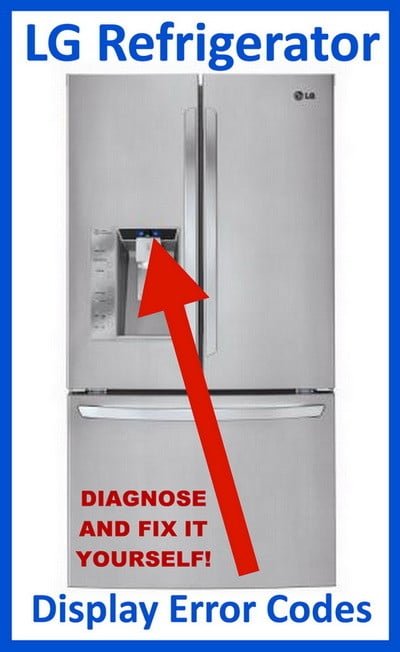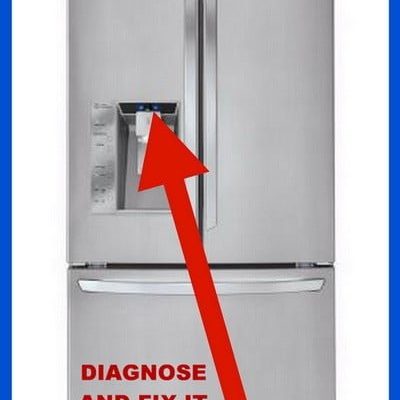
An LG refrigerator showing an error code is basically trying to tell you something important. It’s communicating a specific issue that needs your attention. Imagine it as your refrigerator’s way of sending out an SOS. The F1 code, in particular, is often related to the freezer fan motor, which means something’s not quite right with the cooling system. If the fan’s not spinning as it should, the freezing process could be compromised, which can eventually affect how well your food is preserved. Not great, right?
Understanding the F1 Error Code in LG Refrigerators
The F1 error code in LG refrigerators indicates a problem with the freezer fan motor. You might be wondering why this matters. Well, the fan is responsible for circulating cold air throughout the freezer and fridge compartments. Think of it like a little wind turbine inside your fridge — if it’s not working properly, cold air doesn’t move efficiently, leading to temperature issues.
This error code commonly arises when the motor has failed or there’s a blockage preventing the fan from spinning. It could be that ice has built up around the fan blades. Just like trying to drive a car with flat tires, a blocked or malfunctioning fan can’t do its job effectively. This situation can eventually cause your food to spoil since the fridge won’t be as cold as it needs to be.
If you ignore this issue, you might start noticing that your ice cream isn’t staying as hard, or the vegetables are wilting faster than usual. These are clear signs that the problem is affecting the fridge’s performance. To prevent further hassle, it’s vital to address the error when you first spot it. After all, who wants to throw away good food (and money) just because of a simple error code?
Why You Shouldn’t Ignore Error Codes
Now, let’s dive deeper into why ignoring this error code isn’t the best idea. Ignoring the F1 code is like putting a band-aid over a leaky pipe. The leak won’t go away, and you might end up with a flooded basement down the line. Similarly, ignoring the error could lead to more expensive repairs or even the need for a new refrigerator if the internal components get damaged over time.
When the freezer fan isn’t functioning properly, it creates a ripple effect throughout the appliance. As temperatures rise, your fridge’s compressor will work overtime to try and cool things down. This increased strain not only hikes up energy bills but can also lead to premature wear and tear on the appliance. Imagine running a marathon every day without rest — eventually, something will give.
Moreover, ignoring this signal could lead to more significant issues such as a complete breakdown of the fridge. Since the fan is crucial for maintaining consistent temperatures, letting the problem persist may result in a total cooling failure. And let’s face it, dealing with a fridge full of spoiled food is nobody’s idea of a good time.
Tackling the F1 Error: What to Do Next
So, you see the F1 error code flashing, and you’re ready to take action. What’s next? First, unplug the refrigerator to prevent any electrical mishaps while you investigate. Safety first! Then, check inside the freezer compartment. Is there any noticeable ice buildup around the fan area? If yes, you might need to manually defrost the fridge by leaving it unplugged for a few hours.
If defrosting doesn’t solve the issue, it’s time to consider the possibility of a faulty fan motor. Here’s where you might need a bit of professional help. Contact a qualified appliance repair technician who can diagnose the fan motor’s health more effectively. Trust me, a professional can save you a lot of guesswork and potential DIY disasters.
Additionally, keep an eye on the fridge over the next few days. If the F1 error code reappears or if you notice unusual noises, it might be worth scheduling a maintenance check. This way, you can ensure that all components are functioning harmoniously and avoid future hiccups.
Preventative Measures to Avoid the F1 Code
To keep your LG refrigerator running smoothly and avoid seeing that annoying F1 error code again, there are a few simple steps you can take. Regular maintenance is key. Think of it as giving your fridge a little TLC — checking the seals, cleaning the coils, and making sure there’s no obstruction in the airflow.
Avoid overloading the freezer. Just like cramming too many clothes into a suitcase makes it hard to zip up, overstuffing your freezer restricts airflow and can lead to ice buildup. Keep it organized, and leave a bit of room for air circulation. It’s also worthwhile to periodically check for ice buildup near the fan and clear it away promptly.
Finally, consider investing in a thermometer to monitor your fridge and freezer temperatures. This small investment pays off by offering you peace of mind that your appliance is operating within the right temperature range and can serve as an early warning if things start to go awry.
In summary, while the F1 error code on your LG refrigerator might seem like an inconvenience, it’s really an opportunity to catch a small problem before it snowballs into a bigger one. By taking prompt action and following some straightforward preventative measures, you can ensure your fridge stays in tip-top shape and your food stays fresh.
